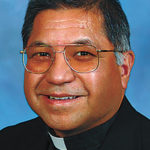A Muscatine family’s car developed a flat tire and they had no money to fix it. They turned to the Muscatine Center for Social Action, which provided the $16 needed to make the repair so that the family could continue to get to and from work.
St. Vincent de Paul Food Pantry in Burlington provides groceries to 125 to 135 families each week, many of whom are working but struggling to make ends meet. Jim Wade, who heads the food pantry, a ministry of Divine Mercy Parish, said he occasionally runs into pantry patrons at the supermarket or a fast-food restaurant where they work. “The jobs just don’t pay enough to support a family,” Wade says. “I’m going to guess that 70 percent or more have a job, but not a good-paying job.”
The lived experiences of the working poor in the Diocese of Davenport and throughout Iowa don’t show up in the U.S. Census report on poverty released Sept. 12. The report states that real median income increased by 1.8 percent between 2016 and 2017 while the official poverty rate decreased 0.4 percentage points. In Iowa, the official poverty rate is 11.8 percent.
A separate Census Bureau report, the Supplemental Poverty Measure, put the poverty rate at 13.9 percent, and was considered not statistically different than the 2016 rate of 14.0 percent. This measure is said to serve as an additional indicator of economic well-being and is conducted in collaboration with the Bureau of Labor Statistics.
The Iowa Policy Project, a nonpartisan, nonprofit public policy research analysis organization, released its own report – Part 3 of its 2018 Cost of Living in Iowa series — a day before the national poverty report’s release. In a nutshell, the IPP report shows that prosperity remains elusive for the approximately 100,000 working family households in Iowa struggling to secure a basic-needs budget.
But the report also offers public policy suggestions that would move struggling families toward flourishing and strengthen their pathway to the middle class. If the General Assembly is truly committed to ensuring that all families in Iowa flourish, they will implement these suggestions made by IPP Research Director Peter Fisher and research associate Natalie Veldhouse:
• Reform Child Care Assistance to eliminate the “cliff effects” that abruptly drop families from the work-support program as soon as they receive a small pay increase. Iowa has one of the lowest rates of eligibility for child care assistance and for reimbursement of daycare providers. A head of household who can’t work because of unaffordable child care results in greater hardship, not family flourishing.
• Expand the Earned Income Tax Credit (EITC), which supports working people with lower incomes, especially those with children. It is one example of a tax credit that is essential to the well-being of our brothers and sisters in Iowa struggling to make ends meet.
• Expand the Child and Dependent Care Credit, which is especially important when Child Care Assistance is lagging. Eligible taxpayers qualify if they have paid for someone to care for a child, dependent or spouse. The care must be necessary so a person can work or look for work, according to the IRS.
• Expand the universal preschool program. This program is a big help to working parents and also fosters child development, education outcomes and workforce readiness, Veldhouse says.
• Adequately fund the per-pupil spending authority in Iowa’s K-12 public schools. Per-pupil spending has remained at 1.7 percent per year for the last nine years and hasn’t kept pace with the cost of educating children, the report states.
• Make post-secondary education affordable. Funding reductions to the state’s regent universities over the past decade means that approximately 70 percent of the cost of a university education is being borne by families and students. Struggling families are being priced out of college while post-secondary education is crucial to attaining jobs that provide good wages.
Contact your Iowa legislators at (https://www.legis.iowa.gov) and your candidates for legislative offices to support family flourishing through these essential programs.
Our pro-life, pro-family church supports government assistance that strengthens families, encourages and rewards work and protects all vulnerable children, born or unborn. Adequate funding for job training and child care are among the building blocks necessary for human flourishing.
Barb Arland-Fye, Editor
arland-fye@davenportdiocese.org











